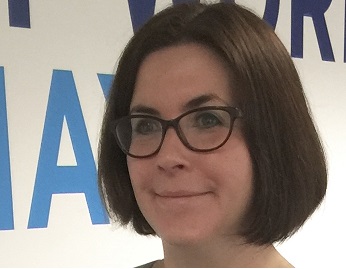7 WAYS TO COMMUNICATE CONFIDENCE
Susie Timlin Chief Operating Officer, UK Government Investments

Project confidence at all times, even when you don’t feel it, and you will be amazed at the positivity that you create around you.
Are you currently preparing for an interview, pitch or a big client meeting? Confidence will be a deciding factor in how well it goes. I have interviewed many candidates over the years with impressive CVs but who, at interview, showed a lack of confidence. For this reason alone I struggled to hire any of them.
Confident people thrive in the office environment. These people are good communicators and are comfortable with tackling problems head on. They also inspire other colleagues to be confident, creating an all-round dynamic and enthusiastic atmosphere.
CONFIDENCE IS A CHOICE
Confidence is a mind-set which comes from within, and it’s attainable for all of us. With that in mind, choose to be confident by following these seven steps:
1. Pretend to be confident
If you don’t consider yourself to be a very confident person then you will find that pretending to be confident is much the same as actually being confident. This is because confidence is a choice. Pretending to be confident will lead to people regarding you as a confident person. Soon enough you will believe them and find yourself acting confident all the time.
2. Communicate clearly
Most of us think being confident depends upon what we say. It doesn’t, it depends upon what the other person hears. That’s why clear communication is so important:
- Speak at a steady and comprehensible pace
- Practice breathing rhythmically and in time with your speech
- Don’t undersell what you are saying by using maybe words such as ‘just’, ‘like’ and ‘perhaps’
- Maintain eye contact at all times, and remember to smile.
3. Use humour
Think about the funniest people that you know. Is it true that they also happen to be the most confident? That’s because being funny is about taking risks. Humour, like confidence, is infectious – so spread it as much as you can, where appropriate.
4. Find a mentor
Pick a mentor to be a constant reminder of where you want to be and what you need to do to get there. Having them is helpful because it reminds you to be ambitious at all times. Pick someone who can help you grow by identifying and nurturing your strengths as well as introducing you to a wider support network.
5. Look the part
If you’re feeling comfortable, then you’re more likely to feel confident. Of course, smart attire is important when attending an interview or presenting, but it’s just as important to feel comfortable. If you’re not comfortable in the clothes that you’re wearing then you’re likely to fidget, which is then likely to be interpreted as restlessness or displaying a lack of interest.
6. Prepare
Preparing fully prior to an important meeting or presentation will help to settle your nerves, get your mind in the frame and ultimately be more confident in your delivery. By failing to prepare for an interview, meeting or presentation, you are preparing to fail.
7. Think positive
Succumbing to negative thoughts is a weakness that most of us suffer from every once in a while. However, it need not be this way. When a negative thought enters your head, make a point to banish it immediately. Reinforce confidence and good feeling by focusing only on the positive and you will see your self-belief grow.
When put into practice, these seven steps will help create a good impression to everyone you meet. People will be drawn to your confidence and soon you will find yourself becoming more successful in the workplace.
AUTHOR
 Susie Timlin
Susie Timlin
Chief Operating Officer, UK Government Investments
Susie is Chief Operating Officer (COO) at UK Government Investments (UKGI). UKGI’s purpose is to be the UK government’s centre of excellence in corporate finance and corporate governance, working across government on some of its most interesting and complex commercial tasks.
In her role as COO, Susie works to ensure that the business has effective operational management, optimal organisational design, and that UKGI are able to hire, develop, manage and remunerate their people in the best way possible.
Prior to joining UKGI, Susie was Global Director for People and Culture at Hays Talent Solutions.

The job interview
The word you are saying too much in job interviews
Discussing your salary expectations
Answering competency-based interview questions
Answering behavioural job interview questions
How to answer, “Why should we hire you?”
Questions to ask following the pandemic outbreak”
How to deal with a counter offer



